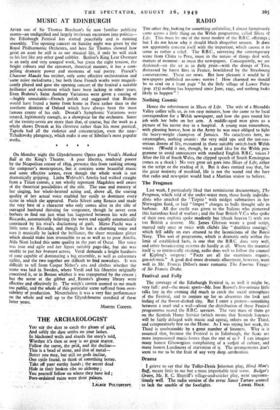AFTER one of Sir Thomas Beecham's by now familiar publicity
stunts—an undignified and largely irrelevant excursion into politics— the Edinburgh Festival has started peacefully and is running smoothly. The opening concert on Sunday night was given by the Royal Philharmonic Orchestra, and here Sir Thomas showed how great an asset he still is to our musical life, if only he will stick tQ his last like any other good cobbler. Berlioz's King Lear Overture is an early and very unequal work, but given the right tension, the bright colours and the extrovert, theatrical manner, it has a com- pelling dramatic power and moments of real poetry. Franck's Chasseur Maudit has neither, only some effective orchestration and 'some naive melodrama ; but both these French works were magnifi- ,cently played and gave the opening concert of the festival a suitable brilliance and excitement which have been lacking in other years. Even Brahms's Saint Anthony Variations were given a coating of —highly unsuitable—French polish and suggested that Brahms would have found a home from home in Paris rather than in the northern districts of Oxford which have always been the most famous centre of his cult. Dvorak's Symphonic Variations were treated, legitimately enough, as a showpiece for the orchestra. Some of the twenty-seven are more than that, of course, but the work as a whole shows Dvorak at his cleverest rather than his most poetical. Tapiola had all the violence and concentration, even the near-6 Tchaikovsky plangency, which make it one of Sibelius's most popular .works.
On Monday night the Glyndebourne Opera gave Verdi's Masked Ball at the King's Theatre. A poor libretto, rendered poorer by the Neapolitan censor of 1859, prevents this from ranking among the composer's masterpieces, but it contains some beautiful music and some effective scenes, even though the whole work is not dramatically gripping. Ljuba Welitsch's Amelia had walked straight from a Titian canvas, a not wholly repentant Magdalen well aware of the theatrical possibilities of the role. The ease and mastery of her singing, her whole-hearted acting and, above all, the soaring quality of her actual voice enabled her easily to dominate every scene in which she appeared. Paolo Silveri sang Renato and made the very best of a character who only comes alive in the rale of outraged husband thirsting for vengeance, though he never even bothers to find out just what has happened between his wife and Riccardo, automatically believing the worst and equally automatically convinced by his rival's disclaiming of guilt. Mirto Picchi was a little tame as Riccardo, and though he has a charming voice and uses it musically he lacked the brilliance, the sheer mundane glitter which should make him irresistible to us as well as to poor Amelia. Alda Noni lacked this same quality in the part of Oscar. Her voice was true and agile and her figure suitably page-like, but she was unable to put her bravura across. Verdi demands a bright hardness of tone capable of dominating a big ensemble, as well as coloratura agility, and the two together are difficult to find nowadays. It was difficult to tell from Caspar Neher's sets and clothes whether the scene was laid in Sweden, where Verdi and his librettist originally conceived it, or in Boston whither it was transported by the censor ; but the scene at the gibbet and, Renato's gloomy library were effective and effectively lit. The witch's cavern seemed to me much too public, and the whole of this particular scene suffered from over- subtlety of production. Nevertheless it was a very fineperformance on the whole and well up to the Glyndebourne standard of these latter years.
MARTIN COOPER-






























 Previous page
Previous page